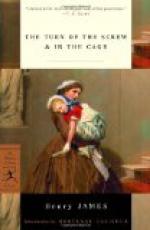CHAPTER XII
She was occasionally worried, however this might be, by the impression that these sacrifices, great as they were, were nothing to those that his own passion had imposed; if indeed it was not rather the passion of his confederate, which had caught him up and was whirling him round like a great steam-wheel. He was at any rate in the strong grip of a dizzy splendid fate; the wild wind of his life blew him straight before it. Didn’t she catch in his face at times, even through his smile and his happy habit, the gleam of that pale glare with which a bewildered victim appeals, as he passes, to some pair of pitying eyes? He perhaps didn’t even himself know how scared he was; but she knew. They were in danger, they were in danger, Captain Everard and Lady Bradeen: it beat every novel in the shop. She thought of Mr. Mudge and his safe sentiment; she thought of herself and blushed even more for her tepid response to it. It was a comfort to her at such moments to feel that in another relation—a relation supplying that affinity with her nature that Mr. Mudge, deluded creature, would never supply—she should have been no more tepid than her ladyship. Her deepest soundings were on two or three occasions of finding herself almost sure that, if she dared, her ladyship’s lover would have gathered relief from “speaking” to her. She literally fancied once or twice that, projected as he was toward his doom, her own eyes struck him, while the air roared in his ears, as the one pitying pair in the crowd. But how could he speak to her while she sat sandwiched there between the counter-clerk and the sounder?
She had long ago, in her comings and goings made acquaintance with Park Chambers and reflected as she looked up at their luxurious front that they of course would supply the ideal setting for the ideal speech. There was not an object in London that, before the season was over, was more stamped upon her brain. She went roundabout to pass it, for it was not on the short way; she passed on the opposite side of the street and always looked up, though it had taken her a long time to be sure of the particular set of windows. She had made that out finally by an act of audacity that at the time had almost stopped her heart-beats and that in retrospect greatly quickened her blushes. One evening she had lingered late and watched—watched for some moment when the porter, who was in uniform and often on the steps, had gone in with a visitor.




